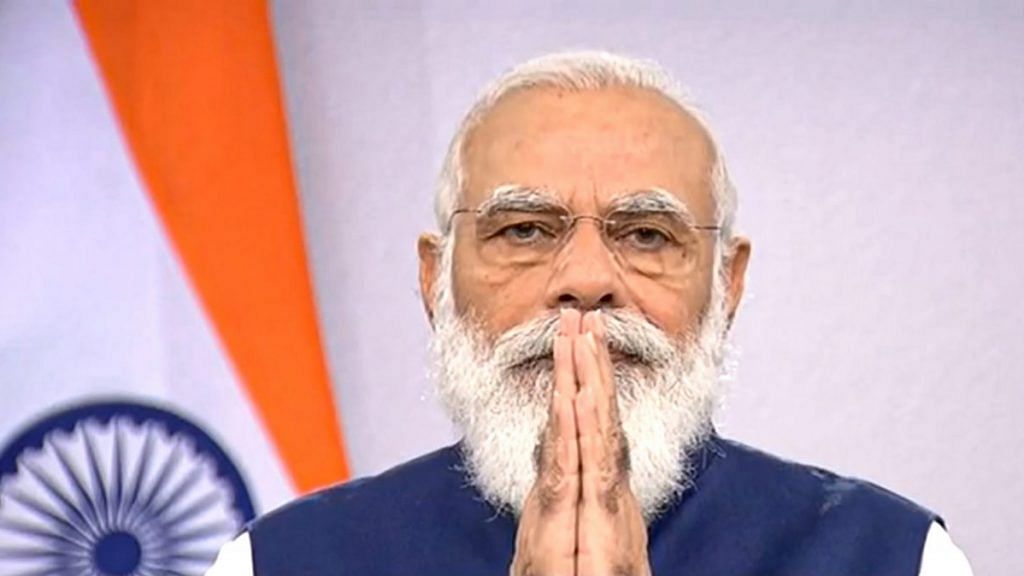New Delhi: Prime Minister Narendra Modi Sunday hailed the passage of the farm bills, saying they have empowered farmers and given them the freedom to sell their produce. The move came a day after Shiromani Akali Dal (SAD), one of the oldest allies of the Bharatiya Janata Party (BJP), walked out of the National Democratic Alliance (NDA) over the same issue.
Modi made the comment during the 69th edition of Mann Ki Baat, his monthly radio address.
Seeking to highlight the value of the new laws, which were passed this week, the prime minister shared inspiring stories of a few farmers, praising them for their work and pointing out how farm reforms have aided them.
He mentioned a farmer from Sonipat district in Haryana, Kanwar Chauhan, recalling the problems he faced in selling his produce outside the mandi. Modi said reforms in the farm sector would benefit both farmers and consumers in the “absence of the middlemen”.
On Friday, farmers’ organisations had held a nationwide agitation against the farm bills passed this week. On the same day, Modi had accused the opposition of misleading farmers as he urged BJP workers to spread awareness on the benefits of the new legislation.
“Do you know what these farmers have different from others? They have the power to sell their fruits/vegetables anywhere and to anyone. And, this power is the foundation of their growth. Other farmers of the country have now got the same power,” he said at Mann ki Baat Sunday.
“They have got the freedom to sell not only fruits/vegetables but anything that they grow like rice, wheat, mustard, sugarcane, to anyone paying a better price.”
Also read: Subramanian Swamy drags PMO into row with Amit Malviya, Tajinder Bagga questions his loyalty
Focus on convincing farmers
Narrating Chauhan’s story, Modi said, “Many a time if he would sell his fruits, vegetables outside Mandi his produce along with his vehicle would be seized. But fruits and vegetables were brought out of the APMC Act in 2014. He and his fellow farmers have been hugely benefitted from this.”
With his farmer friends, Modi said, Chauhan e set up a producer community four years ago.
“Today, farmers of the village are growing sweet corn and baby corn. Their produce is directly being supplied to Delhi’s Azadpur Mandi, big retail chains and five-star hotels. Farmer of village sare earning up to Rs 2.5-3 lakh per annum per acre by growing sweet corn and baby corn,” he said, looking to convince the farmers about the scope of the new laws.
“More than 60 farmers of the village are earning up to Rs 10-12 lakh per acre per annum by growing tomato, cucumber, capsicum, using the net house and poly house,” he said.
Modi also said the agriculture sector has freed itself from many shackles.
“In recent times, these (agriculture) sectors have freed themselves from many shackles. Attempts were made to bust many myths. I get letters from many such farmers and talk to farmers’ organisations… They tell me how new dimensions are being added to agriculture, how farming is changing,” he added.
Also read: For how long will India be kept out of UN’s decision-making structures, Modi asks
Link to Atmanirbhar Bharat
Modi termed farmers and the agriculture sector as the foundation of Atmanirbhar Bharat, his government’s new self-reliance policy.
“One who is grounded stays firm even during the biggest storms. During these tough times of corona, our farm sector and our farmers are a living example of this. Our agricultural sector has again shown its prowess during this crisis,” he said.
“Friends, our farming sector, our farmers, our villages, are the foundation of Atmanirbhar Bharat. If they are strong, then the foundation of Atmanirbhar Bharat will also be strong,” the prime minister added.
In his address, Modi also cited the example of Maharashtra, pointing out how fruits and vegetables were kept out of the ambit of Agricultural Produce Market Committees (APMCs) some years ago.
“How this has changed the condition of fruits/vegetable growers of Maharashtra, Shri Swamy Samarth Farmers Producer Company Limited is a very good example. This is a community of farmers in Pune and Mumbai, farmers are running the weekly market themselves,” he said.
“In these markets, over 4,500 farmers from 70 villages are selling their produce directly, without any middleman. Rural youth are directly involved in the process of farming and trading farmers are directly benefited from this. The youth of villages get employment,” he added.
Modi also cited the example of Uttar Pradesh and Gujarat where farmers are selling directly to big companies and that has “transformed their lives”.
The PM also touched upon the importance of storytelling and folklore in Indian culture in his address.
He also paid tributes to freedom fighters and Mahatma Gandhi. “Had we followed the essence of Bapu’s (Mahatma Gandhi) economic philosophy, we would never have to be working to build an Atmanirbhar Bharat now. It would have happened much earlier,” he added.
Also read: Mahabharata to irresponsible Indians — How Modi govt’s message on Covid changed in 6 months
